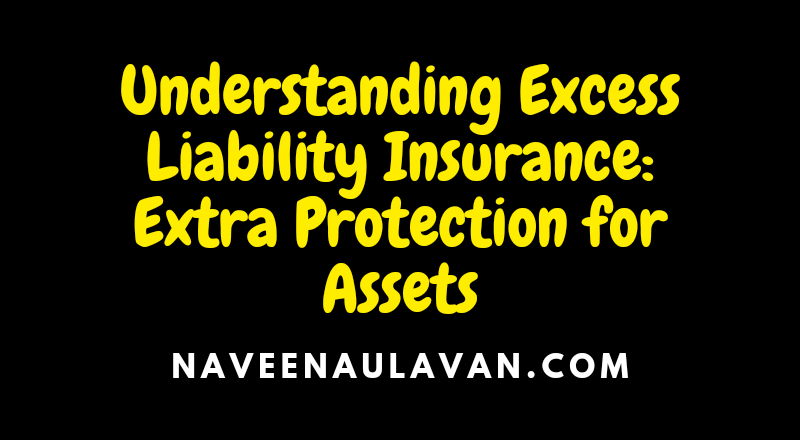In today’s litigious society individuals and businesses alike face the growing risk of lawsuits. While standard insurance policies provide coverage for liabilities they may not be sufficient to protect you from substantial financial losses in the event of a lawsuit. This is where excess liability insurance comes into play. Excess liability insurance also known as umbrella insurance provides an additional layer of protection by extending the coverage limits of your primary insurance policies. In this article we will discuss the ins and outs of excess liability insurance its importance and how it can offer extra protection for your assets.
What is Excess Liability Insurance?
Excess liability insurance is a type of policy that provides coverage above and beyond the limits of your primary insurance policies. It is designed to protect individuals and businesses from major claims and lawsuits that could threaten their financial stability. When the limits of your primary policies such as auto homeowners or general liability insurance are exhausted excess liability insurance kicks in to provide additional coverage.
How does Excess Liability Insurance Work?
Excess liability insurance works by providing coverage that begins where your primary insurance policy ends. Let’s assume you have a homeowners insurance policy with a liability limit of $300000. If you face a lawsuit and the settlement amount exceeds this limit your excess liability insurance will kick in to cover the remaining amount subject to the policy’s limits and terms. It offers an added layer of protection that can greatly minimize your financial exposure in the event of a high-value lawsuit.
Why is Excess Liability Insurance Important?
Excess liability insurance is important for several reasons:
1. Increased Coverage Limits: One of the key advantages of excess liability insurance is that it provides higher coverage limits than your primary policies. This is crucial in protecting your assets in the event of a catastrophic lawsuit where the damages claimed exceed the limits of your primary policies. Without excess liability insurance you may have to bear the burden of paying the excess amount out of pocket.
2. Comprehensive Coverage: Excess liability insurance offers broader coverage than your primary policies. While primary policies may have exclusions or limitations excess liability insurance may fill those gaps and provide coverage for additional risks. It can cover a wide range of liabilities including personal injury property damage libel and slander.
3. Protection from Uninsured or Underinsured Parties: Excess liability insurance also protects you from financial losses caused by parties who are uninsured or underinsured. In the event that the responsible party does not have sufficient insurance coverage to compensate for the damages your excess liability insurance will step in to cover the shortfall.
4. Defense Costs: Excess liability insurance not only covers the damages awarded in a lawsuit but also provides coverage for legal defense costs. Litigation can be expensive and having the financial resources to hire competent legal representation is crucial. Excess liability insurance can help shoulder the cost of legal defense ensuring you have adequate resources to protect your interests.
Who Needs Excess Liability Insurance?
Excess liability insurance is a valuable tool for individuals and businesses alike. Here are some examples of who may benefit from excess liability insurance:
1. High-net-worth individuals: Individuals with substantial assets such as multiple properties valuable artwork or significant investments may require excess liability insurance. This ensures that their assets are protected against potential financial risks.
2. Business Owners: Business owners face a wide range of liabilities from product liability claims to employee lawsuits. Excess liability insurance can provide added protection for businesses helping them mitigate the financial impact of lawsuits.
3. Professionals: Professionals such as doctors lawyers architects and engineers may benefit from excess liability insurance. When dealing with high stakes and potential lawsuits resulting from professional negligence having adequate coverage is crucial.
4. Homeowners: Homeowners can also benefit from excess liability insurance. Accidents injuries or property damage that occur on your premises can result in expensive lawsuits. Excess liability insurance can help protect your home and assets from such risks.
Factors to Consider when Choosing Excess Liability Insurance
When selecting an excess liability insurance policy there are several factors to consider:
1. Coverage Limits: Assess your total assets and liabilities to determine how much coverage you need. It is essential to ensure that the coverage limits provided by the policy adequately protect your assets.
2. Policy Terms and Conditions: Carefully review the policy’s terms and conditions to understand its scope of coverage exclusions and limitations. Ensure that the policy aligns with your specific needs and requirements.
3. Deductibles: Consider the deductibles associated with the policy. A deductible is the amount you must pay out of pocket before the excess liability insurance coverage kicks in. Evaluate whether the deductibles are reasonable and affordable for your financial situation.
4. Cost: Excess liability insurance premiums can vary based on several factors such as the coverage limits your risk profile and the insurer’s underwriting criteria. Obtain multiple quotes and compare them to ensure you are getting the best value for your money.
Conclusion
Excess liability insurance provides an additional layer of protection above and beyond your primary insurance policies. It offers increased coverage limits comprehensive protection and defense cost coverage helping individuals and businesses safeguard their assets from significant financial losses. Whether you are a high-net-worth individual a business owner or a professional excess liability insurance can provide the peace of mind and financial security you need to navigate the complexities of our litigious society. Before making a decision analyze your assets liabilities and risk profile and consult with an insurance professional to determine the right amount of coverage for your specific needs. Remember choosing the right excess liability insurance policy can be a crucial step toward protecting your assets and ensuring your long-term financial stability.
